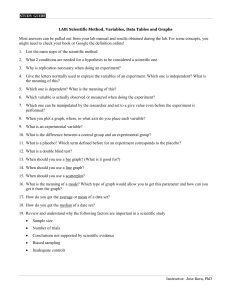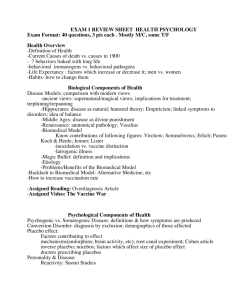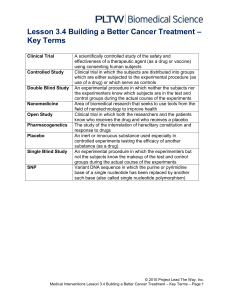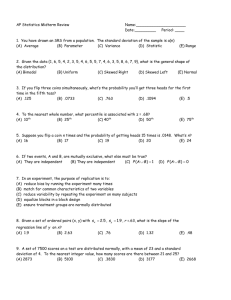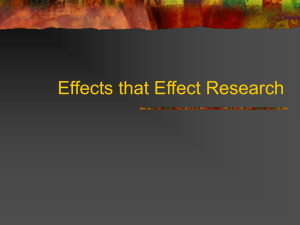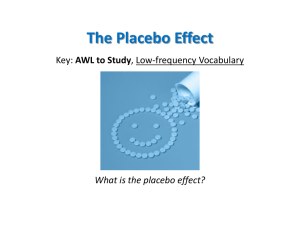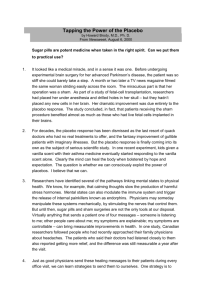Treatment Evaluation
advertisement
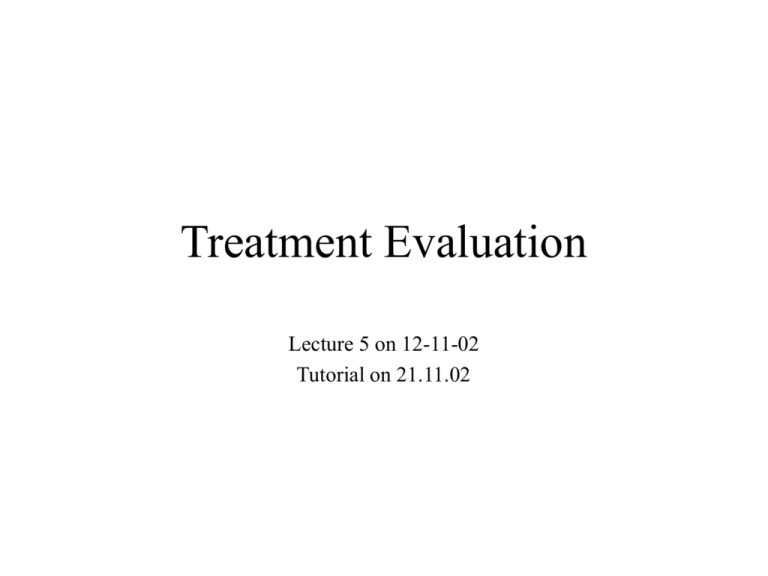
Treatment Evaluation Lecture 5 on 12-11-02 Tutorial on 21.11.02 Authors • Moermann 2000: very biomedically oriented, no anthropological perspective • Lewis and De Boeck are god anthropologists to give insight into the complexities of social relations in treatment evaluations. They have difficult to understand arguments and are usually not cited in discussions on TE • Melrose 1988: Bitter pills: a good book on the social life of medicine (drug export to 3rd World) • Mark Nichter: popular people’s perception is important • Nina Etkin: Ethnopharmacologist, Hawaii, good articles • Gaines A D 1985 and Gordon D R 1988: not directly related to todays lecture but show discrepance within the medical traditions • Cecil Helman: sows GP’s views RCT: double-blind Randomised Control Trials • Check with Wellcome: in 9-2002 they had a conference on the history of RCT • epistemiological questions in evaluation of treatment: • 1. Drug treatment evaluation • 2. Evaluation of traditional medicine • double blind: neither the doctor nor the patient knows what is given during the trial • Folio: meaning response to placebo effect • biomedical view: chemical substance with pharmacological active ingredient is important Placebo:lit. “I will please you” • Placebo has a history and we need to deconstruct the history to understand the concept of placebo • 17th century “pious fraud”, pleasing the patient • But even today every drug comes packaged in a social construct “to please the patient”. Anthropological approach towards treatment evaluation I • We need to deconstruct the notion of the placebo effect • the dichotomy of active ingredient versus placebo/psychology/mind is inappropriate for treatment efficacy • Med Ant should approach the entire phenomenon related to treatment evaluation; placebo is only one part of it • Moermann re-values the placebo but does not deconstruct its effect • We have to show that RCT purely developed for the legitimation of efficacy in biomedicine, rather late (after WWII). Actual medical discoveries were based on simple observation • Treatment efficacy has a historical context that is related to the authorisation of biomedicine Anthropological approach towards treatment evaluation II • Synchronicity between the patient and healer is important for treatment evaluation (Sullivan) • E.g. pulse diagnosis has so many aspects to it to be included in an evaluation: touch, doctor-patient relationship, intimacy, trust, meditation, energy exchange and healing experience of pulse feeling. • Medical anthropology can point out the rationality of dividing the world between the view of biomedicine and RCT-placebo. • Highlight the historical situation, bringing examples of Moermann, but he does not deconstruct the framework, only shows effects of placebos, but we have to deconstruct the framework of thinking in this way. Healing can also happen without placebo effect. • Evidence is a cultural phenomena, a matter of aesthetics, emotional satisfaction, a matter of what is culturally approved • How to evaluate the efficacy of rituals? How to evaluate treatment? • Gilbert Lewis talks f double standard and the hypocrisy of some ethnographers who would still take biomedicine for themselves if they or their children were sick. • Any kind of evaluation is culturally based • there is no universal method of treatment evaluation • we need multi-vocality in treatment evaluation, polyphonic voices, giving a voice to all participants and then disentangle the voices • we have to see who is involved in treatment efficacy, which human agents, institutions, • VALIDITY and RELIAILITY: the methods may be valid in their own epistemiology in a biomedical context, but are they reliable in a larger cultural context? • Kleinmann: every observation is preceded by an assumption which can be unrealistic. Discussion on E Hsu’s article Polyglott Practitioner (1996) • Limiting view of curing versus healing in the Kleinmann fashion • Kleinmann’s view of “reinterpreting people in their psycho-social world” does not imply traditional treatment methods • medical anthropology has to see social-psychological-physical phenomenon • “Biological event does not exist”it is a biomedical concept. Illness and disease is always manifested by a person who is a cultural being and gives meaning to the disease. • Hsu says that she has been growing into wider framework within the past 7 years and that we can criticise her article. Gilbert Lewis taught her at Cambridge and never mentioned the illness-disease debate over Kleinmann.
